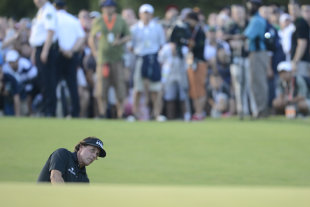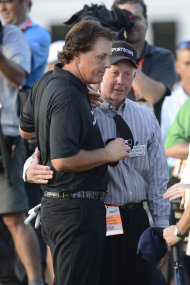Phil Mickelson a champion despite finishing second, again, at the U.S. Open

Eric Adelson June 16, 2013 10:12 PMYahoo Sports
ARDMORE, Pa. – Suddenly, everyone started running.
Hundreds of fans jogged, then sprinted toward the 18th green. They clambered over ropes and trampled manicured fairways. Course officials, there to watch and monitor a normally serene golf crowd, flashed looks of panic in their eyes when they saw the mob.
"MARSHALS!" one yelled. "We need HELP!"
There would not be enough help. There were too many fans, too many people wanting to run at Phil Mickelson, wanting to see him make the chip that would go down in golf history as the shot that forced a playoff and saved his dream of winning the U.S. Open.
Fans slid into bunkers, climbed trees, lost shoes. "This is not a good idea!" said one. "I'll never find my boyfriend!" wailed another.
They ran anyway, kicking up mud and mire behind them like colts in spring. All for a 43-year-old lumbering rock star with a lopsided grin and a history of arthritis.
All those unruly fans, rimming the final hole, finally held perfectly still when Mickelson bent over his shot. So few of them could see the ball around all the heads and shoulders, and nobody cared. They could hear. They could sense. They were there.
Mickelson's chip went up in the air and he ran up the swale after it.
View gallery.

Phil Mickelson stares at his chip on the 18th hole as a crowd behind him looks on. (USA Today)Then the moment was gone. Mickelson had missed his last chance at a tie for first with Justin Rose, finishing second in America's championship for a record sixth time. The fans turned and slouched away.
Heartbreak. That's the word Mickelson used over and over again to describe what he called "very possibly" his most difficult loss. In U.S. Open history, he's the symbol of the near miss, right down to the way his putts rimmed the cup again and again on Sunday in a final-round 74 to finish two shots back. Mickelson, always in second place.
Yet in golf lore, he's something else completely.
There's no rhyme or reason to how Mickelson lost the U.S. Open – again. It felt all day like greater forces were propelling him to win. On 14, after a drenching rain, the sun came out only moments before Mickelson dropped a beautiful chip within par distance. He made it. On 15, Mickelson heard the whoops and shouts of the gallery on his left as he walked, and a rainbow emerged on his right pointing down toward the 17th green where he hit the shot of his life only a day before.
Destiny seemed to await there. Up on the green, USGA commissioner Mike Davis quickly tiptoed to the edge of the putting surface to remind Mickelson's caddie to pull the flagstick (or standard in this case) to avoid a penalty. He was doing his job as a rules official, making sure the player didn't err.
"Bones!" Davis whispered, hand cupping his mouth, gesturing in the direction of the wicker basket. All this came after the shot of the tournament, on 10, when Mickelson pulled a wedge and lofted his approach onto the green and directly into the cup for an eagle and first place at the time. The distance of the shot was wonderfully perfect for Philadelphia: 76 yards.
All that lined up for Mickelson, and all those fans lined up, and still somehow fate didn't line up. The putts he so beautifully traced all week danced by holes, around holes, and ultimately away from holes. The dagger was on 16, when Mickelson stood up on a plateau where he could see the championship green at 18, and he pushed a par putt ever so slightly out to his left.
"That's it," one official said quietly.
How could he say that? This was supposed to be Mickelson's day, Father's Day, his 43rd birthday. Fans serenaded him on every single hole.
"I think I heard 'Happy Birthday' 18 times today," said playing partner Hunter Mahan. "Hopefully I don't wake up tonight screaming Happy Birthday."
There was still hope, though, even after all those missed putts. Mickelson needed a birdie to tie Rose at either 17 or 18, and damned if those fans weren't ready to burst out from the ropeline, grab Lefty's golf ball and slam it into the hole. Mahan's a popular guy on Tour and with fans, but it was as if he wasn't even there. Tiger Woods has huge crowds and din wherever he goes, but this was a different noise. This was urgent, pleading noise. This was almost alarming.
But Mickelson had no more magic. He missed a long putt on 17, pulled his drive on 18, and couldn't hit the green with his Bubba-Watson-at-the-Masters shot from the trees. All he had left was that impossible chip, made to seem so possible by thousands of friends who had never before been within 100 feet of him.
It wasn't to be.
Moments later, after the mob had thinned and the remaining sunlight had ebbed, Mahan spoke about his friend.
"He's a great leader," he said, "and being in golf you don't hear that word very often as a leader. But he's really a leader in the game and he takes his time out to talk to the young guys … He really relishes that role and enjoys it. He's a great guy to admire."
That, in a way, allows what happened to Mickelson Sunday to make a little bit more cosmic sense. Anyone can show people how to win, but how can someone lead in losing?
After Mahan was finished answering questions, Mickelson approached the microphone with his usual Phil gait and his usual Phil smile. If any golfer ever had an excuse to clam up, it was Mickelson. How many athletes simply vanish without a word?
Yet all the answers spilled forth.
View gallery.

Phil Mickelson (left) hugs his father after the final round of theU.S. Open. (USA Today)"I should have made bogeys on those holes and I let them become doubles …"
"Thirteen and 15 were the two bad shots of the day that I'll look back on where I let it go …"
"I think this was my best chance …"
"This one's probably the toughest for me, because at 43 and coming so close five times, it would have changed the way I look at this tournament altogether, and the way I would have looked at my record. Except I just keep feeling heartbreak …"
"If I had won today or if I ultimately win, I'll look back at the other Opens and think that it was a positive. If I never get The Open, then I'll look back and I think that, every time I think of the U.S. Open, I'll just think of heartbreak."
So many people around the country wanted Father's Day to be Phil's Day. Yet fatherhood really isn't about winning anything. It's about guiding younger people to be better. It's about acting in a way you would want the next generation to act.
"He plays golf the right way, the right way you want your kids to play," said Mahan, "and that's by having fun and acting right on the golf course."
No one can ever say Phil Mickelson hasn't done that.
After answering all the questions, the second-place finisher walked slowly back to the scorer's trailer. His eldest daughter, Amanda, born the day after his first U.S. Open heartbreak in 1999, wasn't there. She had strep throat. His wife, Amy, who hugged him after his most recent major championship, was home with Amanda and another child who wasn't feeling well.
Mickelson was greeted on his way by Jill McNeil, a woman who lives on the course. Her property was taken over by the USGA starting back in April. McNeil could look out her back window this week and see generators and trucks and enough wires to trip an army.
McNeil walked up to Mickelson, grabbed his hand and said, "I just want to say it's an honor to have you walk on my driveway."
Mickelson looked her straight in the eye and smiled.
"Thanks," he said, "for all you do."
And away went Phil Mickelson – the U.S. Open's all-time runner up, and the sport's truest champion.
Atricles Course: http://golfatn.blogspot.com/
No comments:
Post a Comment